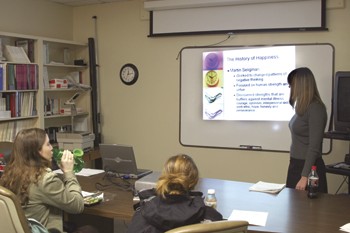
Katherine Guenther (Right) gave a lecture in the Memorial Health Center Wednesday on the history of happiness and the steps toward attaining a more satisfying life. (James Bilowus)
The elusive secret of happiness and how to successfully obtain it has been sought after for generations. Wednesday, this mystery was revealed – or at least some tips on how to obtain it were brought to light.
Katherine Guenther, who has a B.S. in psychology, held a “Brown Bag” luncheon in the Memorial Health Center Wednesday in order to promote personal happiness in everyday life. At least 30 people from the SMU community attended the event.
SMU librarian Dawn Younglood said, “It is a really useful topic that obviously people are very interested in.”
Guenther spoke to the packed room about the scientific history of the study of happiness and the three different types of life one can lead. She finished up by describing steps toward achieving a more satisfying life.
She emphasized the fact that although happiness is intangible, its study is a psychological science that has been examined for at least the past 40 years.
Developed by Dr. Martin Seligman, this field of research has maintained a scientific approach toward the psychological aspects of what makes us happy.
According to Guenther, the three different types of life one can lead depend on the individual. The three key elements to a happier life are approaching your day with the right attitude, the ability to remain in the moment, and transcending personal needs and desires to focus on others.
The discussion continued with eight tips to have a more satisfying life. The tips ranged from taking care of your body to forgiveness.
According to Guenther, “when you have anger or resentment, it is hard to live in the moment.” In addition, she reinforced the idea that the most important thing to do is dedicate time to friends and family.
While at first many attending were hesitant to speak, toward the end of the lecture questions were called out from all sides of the room. Many focused on the issue of happiness in regards to the fairness of wages and income.
“If you play the fairness game, in the long run you are never going to win” Guenther said. In addition, she commented on the idea that subconsciously many people want more money to show up others, but that this is not a proof of true happiness. She pointed out a 2002 study that showed students with the highest levels of happiness were those with strong bonds to friends and family.
The study of happiness was the focus of Guenther’s undergraduate degree at Texas A & M University. While it’s not currently her main field, it has always been of interest to her. In her mind, what is most important is “the idea of not always looking how to get rid of negative things in life, but to increase the positive.”








